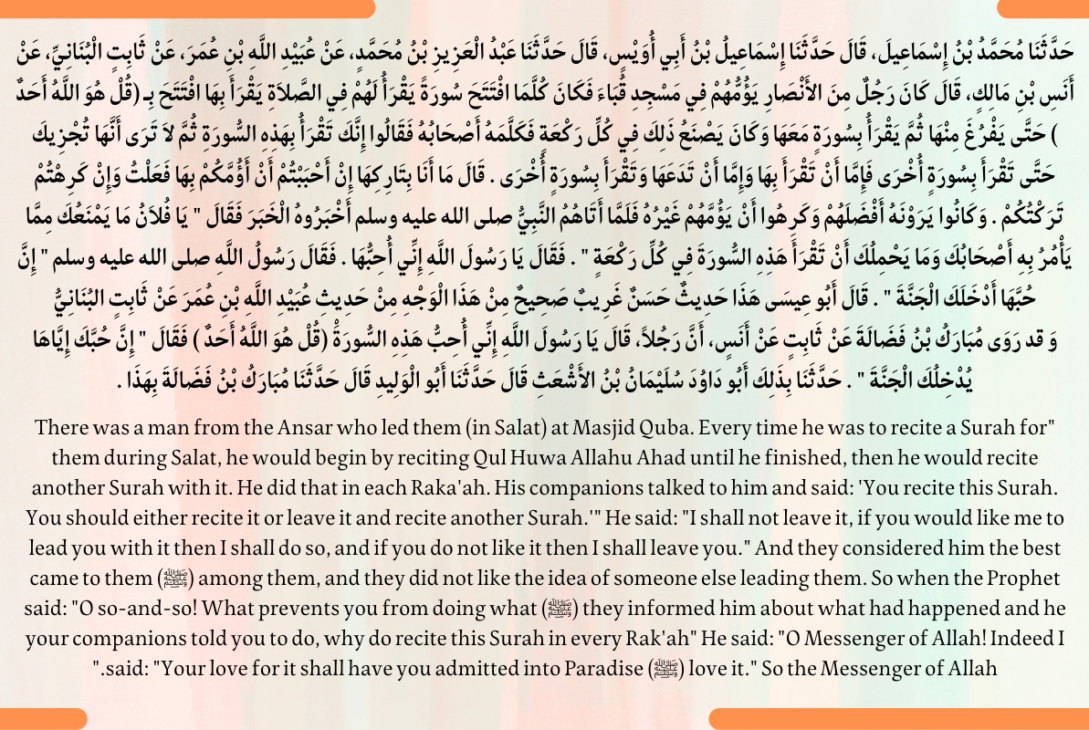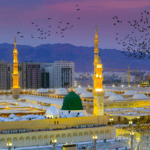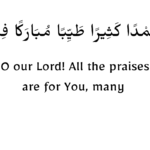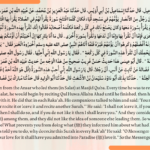بِسْمِ ٱللَّٰهِ ٱلرَّحْمَٰنِ ٱلرَّحِيمِ
In Salat, there exists a beautiful practice that holds immense significance which is reciting Surah al-Ikhlas in every Raka’ah. This practice, narrated in a hadith, sheds light on the love and devotion one can have for a particular Surah and how it can impact their spiritual journey.
The anecdote of a man from the Ansar at Masjid Quba exemplifies the importance of reciting Surah al-Ikhlas consistently during Salat and the profound reward it can bring.
Historical Background of Surah Al-Ikhlas
Your love for it shall have you admitted into Paradise. This profound statement was made by the Prophet Muhammad (peace be upon him) in response to the devotion of a companion who had a special attachment to Surah Al-Ikhlas.
This Surah, also known as Surah At-Tawhid, holds a significant place in the hearts of Muslims for its concise yet comprehensive declaration of the Oneness of Allah.
Revelation Context
Any discussion of Surah Al-Ikhlas must begin with an understanding of its revelation context. This Surah was revealed in the early period of Islam, a time when the concept of monotheism was being firmly established among the new Muslim community in Makkah. The simplicity and clarity of Surah Al-Ikhlas helped reinforce this fundamental belief in the hearts of the believers.
Significance in Early Islamic Practice
Early Islamic practice revolved around the emphasis on the belief in the Oneness of Allah, and Surah Al-Ikhlas played a pivotal role in shaping this foundation. The Prophet Muhammad (peace be upon him) himself encouraged the recitation of this Surah, acknowledging the special merit it holds.
Its inherent message of the absolute Unity of Allah resonated deeply with the early Muslims, guiding them in their worship and daily lives.
Hadith Regarding Reciting Surah al-Ikhlas in Every Raka’ah
حَدَّثَنَا مُحَمَّدُ بْنُ إِسْمَاعِيلَ، قَالَ حَدَّثَنَا إِسْمَاعِيلُ بْنُ أَبِي أُوَيْسٍ، قَالَ حَدَّثَنَا عَبْدُ الْعَزِيزِ بْنُ مُحَمَّدٍ، عَنْ عُبَيْدِ اللَّهِ بْنِ عُمَرَ، عَنْ ثَابِتٍ الْبُنَانِيِّ، عَنْ أَنَسِ بْنِ مَالِكٍ، قَالَ كَانَ رَجُلٌ مِنَ الأَنْصَارِ يَؤُمُّهُمْ فِي مَسْجِدِ قُبَاءَ فَكَانَ كُلَّمَا افْتَتَحَ سُورَةً يَقْرَأُ لَهُمْ فِي الصَّلاَةِ يَقْرَأَ بِهَا افْتَتَحَ بِـ (قُلْ هُوَ اللَّهُ أَحَدٌ ) حَتَّى يَفْرُغَ مِنْهَا ثُمَّ يَقْرَأُ بِسُورَةٍ مَعَهَا وَكَانَ يَصْنَعُ ذَلِكَ فِي كُلِّ رَكْعَةٍ
فَكَلَّمَهُ أَصْحَابُهُ فَقَالُوا إِنَّكَ تَقْرَأُ بِهَذِهِ السُّورَةِ ثُمَّ لاَ تَرَى أَنَّهَا تُجْزِيكَ حَتَّى تَقْرَأَ بِسُورَةٍ أُخْرَى فَإِمَّا أَنْ تَقْرَأَ بِهَا وَإِمَّا أَنْ تَدَعَهَا وَتَقْرَأَ بِسُورَةٍ أُخْرَى . قَالَ مَا أَنَا بِتَارِكِهَا إِنْ أَحْبَبْتُمْ أَنْ أَؤُمَّكُمْ بِهَا فَعَلْتُ وَإِنْ كَرِهْتُمْ تَرَكْتُكُمْ . وَكَانُوا يَرَوْنَهُ أَفْضَلَهُمْ وَكَرِهُوا أَنْ يَؤُمَّهُمْ غَيْرُهُ فَلَمَّا أَتَاهُمُ النَّبِيُّ صلى الله عليه وسلم أَخْبَرُوهُ الْخَبَرَ فَقَالَ ” يَا فُلاَنُ مَا يَمْنَعُكَ مِمَّا يَأْمُرُ بِهِ أَصْحَابُكَ وَمَا يَحْمِلُكَ أَنْ تَقْرَأَ هَذِهِ السُّورَةَ فِي كُلِّ رَكْعَةٍ ”
.
فَقَالَ يَا رَسُولَ اللَّهِ إِنِّي أُحِبُّهَا . فَقَالَ رَسُولُ اللَّهِ صلى الله عليه وسلم ” إِنَّ حُبَّهَا أَدْخَلَكَ
الْجَنَّةَ ” . قَالَ أَبُو عِيسَى هَذَا حَدِيثٌ حَسَنٌ غَرِيبٌ صَحِيحٌ مِنْ هَذَا الْوَجْهِ مِنْ حَدِيثِ عُبَيْدِ اللَّهِ بْنِ عُمَرَ عَنْ ثَابِتٍ البُنَانِيُّ
Narrated Anas bin Malik: “There was a man from the Ansar who led them (in Salat) at Masjid Quba. Every time he was to recite a Surah for them during Salat, he would begin by reciting Qul Huwa Allahu Ahad until he finished, then he would recite another Surah with it. He did that in each Raka’ah.
وَ قد رَوَى مُبَارَكُ بْنُ فَضَالَةَ عَنْ ثَابِتٍ عَنْ أَنَسٍ، أَنَّ رَجُلاً، قَالَ يَا رَسُولَ اللَّهِ إِنِّي أُحِبُّ هَذِهِ السُّورَةَْ (قُلْ هُوَ اللَّهُ أَحَدٌ ) فَقَالَ ” إِنَّ حُبَّكَ إِيَّاهَا يُدْخِلُكَ الْجَنَّةَ ” . حَدَّثَنَا بِذَلِكَ أَبُو دَاوُدَ سُلَيْمَانُ بْنُ الأَشْعَثِ قَالَ حَدَّثَنَا أَبُو الْوَلِيدِ قَالَ حَدَّثَنَا مُبَارَكُ بْنُ فَضَالَةَ بِهَذَا .
His companions talked to him and said: ‘You recite this Surah. You should either recite it or leave it and recite another Surah.'” He said: “I shall not leave it, if you would like me to lead you with it then I shall do so, and if you do not like it then I shall leave you.” And they considered him the best among them, and they did not like the idea of someone else leading them.
So when the Prophet (ﷺ) came to them they informed him about what had happened and he (ﷺ) said: “O so-and-so! What prevents you from doing what your companions told you to do, why do recite this Surah in every Raka’ah” He said: “O Messenger of Allah! Indeed I love it.” So the Messenger of Allah (ﷺ) said: “Your love for it shall have you admitted into Paradise.”
Source: Jami` at-Tirmidhi 2901
Narrated by: Anas bin Malik (RA)
The Virtues of Surah Al-Ikhlas
Even though Surah Al-Ikhlas is short in length, it holds immense significance in Islam due to its unique attributes and virtues.
Hadiths Highlighting its Merits
An incident narrated in a hadith mentions a man from the Ansar who used to recite Surah Al-Ikhlas in every Raka’ah of Salah. When questioned by his companions, he expressed his deep love for the Surah.
Upon hearing this, the Prophet Muhammad (ﷺ) informed him that his love for Surah Al-Ikhlas would lead to his admission into Paradise.
Comparison with Other Surahs
With its concise yet comprehensive nature, Surah Al-Ikhlas stands out compared to other Surahs in the Quran. An analysis of its themes, meanings, and significance showcases the unparalleled beauty and depth of this Surah.
Surah:
| Themes | Unity of Allah |
| Significance | Equivalent to one-third of the Quran |
Basis in Sunnah and Hadith
Al-Ikhlas, also known as Surah 112, is one of the shortest yet most powerful chapters of the Quran. The Prophet Muhammad (peace be upon him) encouraged its frequent recitation in Salah due to its concise message about the Oneness of Allah and the purity of faith.
There are narrations in Hadith that highlight the virtues of reciting Surah Al-Ikhlas regularly in Salah, emphasizing its importance in strengthening one’s faith and connection with Allah.
Scholarly Views and Interpretations
Many scholars have discussed the significance of reciting Surah Al-Ikhlas in every Raka’ah of Salah. Some scholars interpret this practice as a form of reaffirming one’s belief in the Oneness of Allah throughout each prayer, enhancing spiritual focus and concentration.
The repetition of this Surah also serves as a reminder of the fundamental principles of faith, ensuring that worship is centered on pure monotheism.
Personal and Congregational Prayers
Congregational prayers offer a perfect opportunity to implement the recitation of Surah al-Ikhlas alongside your personal Solat. You can lead your family or friends in Solat and include this practice to reap its spiritual benefits collectively.
Plus, the Prophet (ﷺ) himself praised the love for Surah al-Ikhlas, promising paradise to those who hold it dear. Let this serve as a motivation to include this beautiful Surah in every aspect of your Solat journey.
Conclusively
Reciting Surah Al-Ikhlas in every Raka’ah of Salat has a special significance in Islam, as highlighted in the hadith narrated above. The Prophet Muhammad (ﷺ) acknowledged the love the man from the Ansar had for this Surah and assured him that his love for it would be rewarded with admission into Paradise.
This emphasizes the importance of reciting and reflecting upon the meanings of this Surah in our daily prayers, as it serves as a reminder of the Oneness of Allah and strengthens our faith.
While it is not obligatory to recite Surah Al-Ikhlas in every Raka’ah, this narration exemplifies the beauty and reward of doing so out of love and devotion. It reminds us that our intentions and love for certain acts of worship can have a profound impact on our spiritual journey.
May we all strive to deepen our connection with the words of Allah and find solace and comfort in the recitation of Surah Al-Ikhlas in our prayers.









